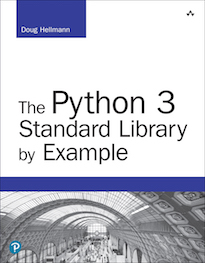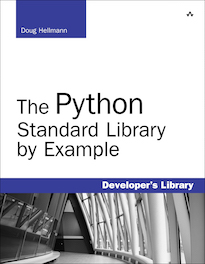compileall – Byte-compile Source Files¶
| Purpose: | Convert source files to byte-compiled version. |
|---|---|
| Available In: | 1.4 |
The compileall module finds Python source files and compiles them to the byte-code representation, saving the results in .pyc or .pyo files.
Compiling One Directory¶
compile_dir() is used to recursively scan a directory and byte-compile the files within it.
import compileall
compileall.compile_dir('examples')
By default, all of the subdirectories are scanned to a depth of 10. When using a version control system such as subversion, this can lead to unnecessary scanning, as seen here:
$ python compileall_compile_dir.py
Listing examples ...
Listing examples/.svn ...
Listing examples/.svn/prop-base ...
Listing examples/.svn/text-base ...
Compiling examples/a.py ...
Listing examples/subdir ...
Listing examples/subdir/.svn ...
Listing examples/subdir/.svn/prop-base ...
Listing examples/subdir/.svn/text-base ...
Compiling examples/subdir/b.py ...
To filter directories out, use the rx argument to provide a regular expression to match the names to exclude.
import compileall
import re
compileall.compile_dir('examples',
rx=re.compile(r'/\.svn'))
$ python compileall_exclude_dirs.py
Listing examples ...
Listing examples/.svn ...
Listing examples/.svn/prop-base ...
Listing examples/.svn/text-base ...
Compiling examples/a.py ...
Listing examples/subdir ...
Listing examples/subdir/.svn ...
Listing examples/subdir/.svn/prop-base ...
Listing examples/subdir/.svn/text-base ...
Compiling examples/subdir/b.py ...
The maxlevels argument controls the depth of recursion. For example, to avoid recursion entirely pass 0.
import compileall
import re
compileall.compile_dir('examples',
maxlevels=0,
rx=re.compile(r'/\.svn'))
$ python compileall_recursion_depth.py
Listing examples ...
Compiling examples/a.py ...
Compiling sys.path¶
All of the Python source files found in sys.path can be compiled with a single call to compile_path().
import compileall
import sys
sys.path[:] = ['examples', 'notthere']
print 'sys.path =', sys.path
compileall.compile_path()
This example replaces the default contents of sys.path to avoid permission errors while running the script, but still illustrates the default behavior. Note that the maxlevels value defaults to 0.
$ python compileall_path.py
sys.path = ['examples', 'notthere']
Listing examples ...
Compiling examples/a.py ...
Listing notthere ...
Can't list notthere
From the Command Line¶
It is also possible to invoke compileall from the command line, as you might when integrating it with a build system via a Makefile. For example:
$ python -m compileall -h
option -h not recognized
usage: python compileall.py [-l] [-f] [-q] [-d destdir] [-x regexp] [-i list] [directory|file ...]
-l: don't recurse down
-f: force rebuild even if timestamps are up-to-date
-q: quiet operation
-d destdir: purported directory name for error messages
if no directory arguments, -l sys.path is assumed
-x regexp: skip files matching the regular expression regexp
the regexp is searched for in the full path of the file
-i list: expand list with its content (file and directory names)
To recreate the example above, skipping .svn directories, one would run:
$ python -m compileall -x '/\.svn' examples
Listing examples ...
Listing examples/.svn ...
Listing examples/.svn/prop-base ...
Listing examples/.svn/text-base ...
Compiling examples/a.py ...
Listing examples/subdir ...
Listing examples/subdir/.svn ...
Listing examples/subdir/.svn/prop-base ...
Listing examples/subdir/.svn/text-base ...
Compiling examples/subdir/b.py ...
See also
- compileall
- The standard library documentation for this module.

